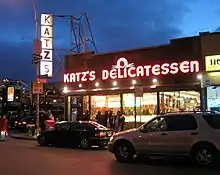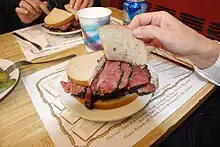Jewish deli
A Jewish deli, also known as a Jewish delicatessen, is a delicatessen establishment that serves various traditional dishes in Ashkenazi Jewish cuisine, and are typically known for their sandwiches such as pastrami on rye, as well as their soups such as matzo ball soup, among other dishes. Most of these establishments are traditionally considered Ashkenazi. Like much of the Jewish cuisine stemming from the period of the Jewish diaspora, the emergence of the Jewish deli developed in accordance with local culture. These days, Jewish delicatessens serve a variety of Jewish dishes. While some delis have full kosher-certification, others operate in a kosher-style, refraining from mixing meat and dairy in the same dish, despite potentially using non-certified ingredients.[1] There are also delis that serve food without adhering to any traditional Jewish dietary restrictions, offering non-Kosher dishes such as the Reuben sandwich.

Jewish delis feature prominently in Jewish culture, as well as in general American popular culture, particularly in the cities of New York, Chicago and Los Angeles as well as in Canada, especially in Montreal and Toronto. The United Kingdom has also historically been a home to many Jewish delis, especially in the London area.[2][3][4][5][6]
In the United States
The origins of the American Jewish delicatessen can be traced back to the wave of German immigration to the United States in the mid 1800s. In the decade spanning from 1850 to 1860 nearly one million Germans immigrated to America, both Jews and non-Jews, with 215,000 Germans arriving in the United States in 1854 alone.[7] Some of these immigrants opened storefronts to make a living, and to offer culturally familiar food to other immigrants. Many of the original establishments were inspired by German Delikatessens, selling beef frankfurters, sauerkraut, cold cuts, dill pickles and liverwurst.[8]
According to American author and professor Ted Merwin, the deli experienced its most significant growth not during the initial wave of immigration, as commonly assumed, but rather during the Interbellum Period. It was during this time that the offspring of Jewish immigrants marked their achievements in America by frequenting delis in the theater district, where they indulged in sandwiches and cheesecake. It was the kosher deli that trailed the Jewish community as they dispersed into the city's outer boroughs, serving as a tangible emblem of their enduring commitment to their cultural heritage. [9]
After the Holocaust, a new Jewish population within the United States would facilitate the reintroduction of these community staples. While upon their arrival many of the post-war Jewish immigrants would work in the meat industry, some business owners would transform their butcher shops into operational delicatessens, something that modern Americans are likely to be familiar with.[10]
As Jewish delis rose in popularity within New York, they became a bridge between second generation Jewish immigrants and their origins. They served as a cultural gathering place for the community. Merwin suggests that the Jewish deli became a secular equivalent of the Synagogue for a generation of Jews who were no longer as interested in attending religious services.[11] The second generation's increased access to deli meats was a sign of growing success, something their parents would not have been able to afford when first arriving to the United States.[10]

See also
References
- "What is Kosher Style?". My Jewish Learning.
- "Montreal's Jewish Food Traditions, Mapped". 27 February 2017.
- Solomonov, Michael. Israeli Soul.
- Marks, Rabbi Gil. The Encyclopedia of Jewish Food.
- The Ratner's Cookbook.
- "In St John's Wood, a 79-year-old Jewish Deli has become a culinary status symbol". 13 October 2022.
- "The Germans in America". Library of Congress. Retrieved 2023-10-17.
- Lalomia, Felicia (2022-11-02). "The Jewish Deli Is An NYC Icon. Here's How It's Changed". Delish.
- "The history of an iconic food in Jewish American culture". NYU Press.
- "1. According to the Customer's Desire", Pastrami on Rye, New York University Press, pp. 17–52, 2020-12-31, ISBN 978-0-8147-6274-5, retrieved 2023-05-08
- Merwin, Ted (July 28, 2022). "Pastrami on Rye: An Overstuffed History of the Jewish Deli" (video). youtube.com. Morristown Library.
External links
- Rachel Simon recalls her family's Kosher Deli Restaurant on Mermaid Avenue - Brooklyn, NY - Interview conducted by the Coney Island History Project